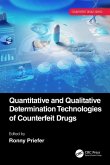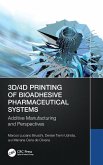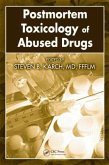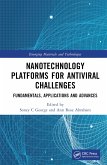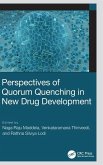Technologies and Innovations for Sustainable Development
Herausgeber: Pandey, Anjana; Kumar, Rakesh; Pandey, Ashutosh
Technologies and Innovations for Sustainable Development
Herausgeber: Pandey, Anjana; Kumar, Rakesh; Pandey, Ashutosh
- Gebundenes Buch
- Merkliste
- Auf die Merkliste
- Bewerten Bewerten
- Teilen
- Produkt teilen
- Produkterinnerung
- Produkterinnerung
"Technologies and Innovations for Sustainable Development" offers a comprehensive exploration of cutting-edge solutions that can help us build a greener, more equitable future. Too often, technologies are either not developed for a sufficiently profitable market, or if developed, are not accessible or well-adapted to end-user needs.
Andere Kunden interessierten sich auch für
![Quantitative and Qualitative Determination Technologies of Counterfeit Drugs Quantitative and Qualitative Determination Technologies of Counterfeit Drugs]() Quantitative and Qualitative Determination Technologies of Counterfeit Drugs154,99 €
Quantitative and Qualitative Determination Technologies of Counterfeit Drugs154,99 €![Metals in Medicine Metals in Medicine]() Metals in Medicine262,99 €
Metals in Medicine262,99 €![3d/4D Printing of Bioadhesive Pharmaceutical Systems 3d/4D Printing of Bioadhesive Pharmaceutical Systems]() Marcos Luciano Bruschi3d/4D Printing of Bioadhesive Pharmaceutical Systems144,99 €
Marcos Luciano Bruschi3d/4D Printing of Bioadhesive Pharmaceutical Systems144,99 €![Metals in Medicine Metals in Medicine]() Metals in Medicine264,99 €
Metals in Medicine264,99 €![Postmortem Toxicology of Abused Drugs Postmortem Toxicology of Abused Drugs]() Steven B. Karch (ed.)Postmortem Toxicology of Abused Drugs197,99 €
Steven B. Karch (ed.)Postmortem Toxicology of Abused Drugs197,99 €![Nanotechnology Platforms for Antiviral Challenges Nanotechnology Platforms for Antiviral Challenges]() Nanotechnology Platforms for Antiviral Challenges165,99 €
Nanotechnology Platforms for Antiviral Challenges165,99 €![Perspectives of Quorum Quenching in New Drug Development Perspectives of Quorum Quenching in New Drug Development]() Perspectives of Quorum Quenching in New Drug Development174,99 €
Perspectives of Quorum Quenching in New Drug Development174,99 €-
-
-
"Technologies and Innovations for Sustainable Development" offers a comprehensive exploration of cutting-edge solutions that can help us build a greener, more equitable future. Too often, technologies are either not developed for a sufficiently profitable market, or if developed, are not accessible or well-adapted to end-user needs.
Hinweis: Dieser Artikel kann nur an eine deutsche Lieferadresse ausgeliefert werden.
Hinweis: Dieser Artikel kann nur an eine deutsche Lieferadresse ausgeliefert werden.
Produktdetails
- Produktdetails
- Verlag: Taylor & Francis Ltd
- Seitenzahl: 220
- Erscheinungstermin: 13. März 2025
- Englisch
- Abmessung: 234mm x 156mm
- Gewicht: 600g
- ISBN-13: 9781032782584
- ISBN-10: 1032782587
- Artikelnr.: 71554493
- Herstellerkennzeichnung
- Libri GmbH
- Europaallee 1
- 36244 Bad Hersfeld
- gpsr@libri.de
- Verlag: Taylor & Francis Ltd
- Seitenzahl: 220
- Erscheinungstermin: 13. März 2025
- Englisch
- Abmessung: 234mm x 156mm
- Gewicht: 600g
- ISBN-13: 9781032782584
- ISBN-10: 1032782587
- Artikelnr.: 71554493
- Herstellerkennzeichnung
- Libri GmbH
- Europaallee 1
- 36244 Bad Hersfeld
- gpsr@libri.de
Dr. Anjana Pandey is a Professor in the Department of Biotechnology at Motilal Nehru National Institute of Technology (MNNIT) Allahabad, located in Uttar Pradesh, India. With extensive experience in environmental and health biotechnology, Dr. Pandey's research focuses on bio-waste to biofuel conversion, genetically engineered microbes for biofuel enhancement, development of diagnostic markers for diseases, and the application of nanoparticles in disease identification and drug delivery. Dr. Pandey has received her Postdoctoral Fellowship in Molecular Microbiology, Bose Institute, Kolkata (1999-2001) and Ph.D. in Biochemistry, Banaras Hindu University, Varanasi (1998). She has been engaged in teaching in research for more than 24 years. Dr. Pandey has received numerous accolades, including the Dr. Sarvepalli Radhakrishnan Life Time Achievement IRDP Award 2023, the Millet Best Dish Award, and the International Young Scientist Award 2023. She has also been recognized as one of the 100 most dedicated professors by the World Education Congress in 2019.Dr. Pandey has led various significant projects, including: development of an electrochemical sensor for anticancer drug detection, augmentation of biohydrogen production using nanoparticles, integrated biohydrogen production from renewable biomass, generation of improved photovoltaic devices, and molecular mapping for plant pathogen detection. Dr. Pandey has provided consultancy services in areas like lake water analysis for U.P. Jal Nigam, Ramgarh Lake at Gorakhpur. With over 81 publications, Dr. Pandey holds several patents, including ones for an optical biosensor for Salmonella detection and a novel method for heavy metal detection using gold nanoparticles. She has been invited to deliver lectures and participate in academic councils and conferences worldwide, including institutions in Germany, Norway, Australia, and Russia. Dr. Pandey's contribution to biotechnology, especially in biofuel and environmental sustainability, marks her as a distinguished scientist and academician in her field. Dr. Rakesh Kumar is presently working as Assistant Professor in the School of Management Studies, Motilal Nehru National Institute of Technology Allahabad, Uttar Pradesh, India. He has been involved in teaching and research for the last 10 years. He has received his Ph.D. from the Department of Business Administration, University of Lucknow, and his Master of Business Administration from Madan Mohan Malviya Government Engineering College, Gotrakhpur, Uttar Pradesh. His research mainly focuses on sustainable consumption, green consumption, circular consumption, sustainable business practices, adoption of emerging technologies. He has published a number of papers in Scopus/SCIE/SSCI/ABDC-listed Journals. He has presented his research work in numerous national and international conferences and has organized several workshops and FDPs on contemporary issues. He is also a reviewer for many internationally renowned journals. He is a resource person and expert in data analysis using MS Excel, SPSS, AMOS, and R & R Studio. He has chaired session in several national and international conferences and delivered expert lectures in several webinars/FDPs/workshops etc. Dr. Ashutosh Pandey is Professor in the Department of Chemistry at Motilal Nehru National Institute of Technology (MNNIT) Allahabad, located in Prayagraj, Uttar Pradesh, India. With a robust background in chemistry, Dr. Pandey's research interests encompass nanotechnology, material science, and photocatalysis. Dr. Pandey received his Ph.D. in chemistry (1999) and Master of Science (M.Sc.) in chemistry from Banaras Hindu University, Varanasi (1994). He has served in various academic and research positions, contributing significantly to his field through numerous research projects and publications. Dr. Pandey has a strong portfolio of research with several patents to his name. Notable patents include an optical biosensor and a method of preparation for the detection of Salmonella Typhi, process optimization using Bacillus Licheniformis for biohydrogen production from corn starch, and a novel method for heavy metal detection using gold nanoparticles. Dr. Pandey has published extensively in renowned journals. Some key publications include: Synthesis and characterization of heterometallic aggregates in the European Journal of Inorganic Chemistry, studies on hydrogen production by microorganisms within reverse micelles in the International Journal of Hydrogen Energy, research on nanophosphors in Materials Chemistry & Physics and IEEE Transactions on Nanobioscience, and investigations into the synthesis and structural characterization of various compounds in journals like Inorganica Chemica Acta and Z. Naturforsch. He is a recipient of many prestigious awards, honours and recognitions including the DST-Nanoscience & Nanotechnology PDF ship award (2007), a nomination for Member of Core Group for the Solar Energy Mission, Govt. of U.P., India, the DST-SERC Young Scientist Project award (September 2003), and membership in the American Chemical Society. Dr. Pandey has led and participated in various research projects focusing on the synthesis and application of nanomaterials, photocatalysis, and the development of advanced materials for energy and environmental applications. He has also provided consultancy services, contributing his expertise to industrial and governmental projects. Dr. Pandey's contributions to the field of chemistry, particularly in nanotechnology and material science, have established him as a prominent researcher and educator. His work continues to impact the scientific community and contribute to advancements in environmental sustainability and energy solutions.
Potential Use of Microorganisms in Bioreactors for H2 Production
Health and Environmentally Sustainable Systems-An opinion
Simultaneous electrochemical sensing of organic dyes from wastewater
effluent: A sustainable approach
Revolutionizing Drug Discovery and Development: The Impact of In silico
and Bioinformatics Approaches
Unlocking the potential of Bacillus firmus NMBL-03 for enhanced hydrogen
production using Response Surface Methodology
Prediction of PM2.5 levels using ANN and MLR machine Learning Models for
Lucknow in India
Effect of operating parameters on condition monitoring of rotor-bearing
system using deep learning
Utilization of Waste BOF Slag in Porous Concrete Pavement to Enhance
Sustainability
Process Parameter Optimization of Electrochemical Machining Processes Using
the Rao Algorithms
Controlling of Automobile Exhaust Emissions Using Adsorption Technique
Implementation of Triplicate Fuel Blends to Enhance Diesel Engine
Characteristics
Data based diagnosis of SOFC performance using Machine Learning approach
Production optimization of EPS and Photosynthetic pigment (Chlorophyll-a,
Chlorophyll-b, Carotenoids) production from Chlorella using BBD matrix for
RSM
CFD Simulation of Operation Theatre for Comfort of Patient
VRIKSHKOSH: Application Of Geospatial Technologies in Developing Curated
Medicinal Plant Database
Effect of Sand Mixing on the Geotechnical Properties of Black Cotton Soil
A Review-Additive Manufacturing Process, Classification, Post Process,
Porosity and Fatigue Fracture
Optimization of Waste Transformer Oil into Value Added Products
Health and Environmentally Sustainable Systems-An opinion
Simultaneous electrochemical sensing of organic dyes from wastewater
effluent: A sustainable approach
Revolutionizing Drug Discovery and Development: The Impact of In silico
and Bioinformatics Approaches
Unlocking the potential of Bacillus firmus NMBL-03 for enhanced hydrogen
production using Response Surface Methodology
Prediction of PM2.5 levels using ANN and MLR machine Learning Models for
Lucknow in India
Effect of operating parameters on condition monitoring of rotor-bearing
system using deep learning
Utilization of Waste BOF Slag in Porous Concrete Pavement to Enhance
Sustainability
Process Parameter Optimization of Electrochemical Machining Processes Using
the Rao Algorithms
Controlling of Automobile Exhaust Emissions Using Adsorption Technique
Implementation of Triplicate Fuel Blends to Enhance Diesel Engine
Characteristics
Data based diagnosis of SOFC performance using Machine Learning approach
Production optimization of EPS and Photosynthetic pigment (Chlorophyll-a,
Chlorophyll-b, Carotenoids) production from Chlorella using BBD matrix for
RSM
CFD Simulation of Operation Theatre for Comfort of Patient
VRIKSHKOSH: Application Of Geospatial Technologies in Developing Curated
Medicinal Plant Database
Effect of Sand Mixing on the Geotechnical Properties of Black Cotton Soil
A Review-Additive Manufacturing Process, Classification, Post Process,
Porosity and Fatigue Fracture
Optimization of Waste Transformer Oil into Value Added Products
Potential Use of Microorganisms in Bioreactors for H2 Production
Health and Environmentally Sustainable Systems-An opinion
Simultaneous electrochemical sensing of organic dyes from wastewater
effluent: A sustainable approach
Revolutionizing Drug Discovery and Development: The Impact of In silico
and Bioinformatics Approaches
Unlocking the potential of Bacillus firmus NMBL-03 for enhanced hydrogen
production using Response Surface Methodology
Prediction of PM2.5 levels using ANN and MLR machine Learning Models for
Lucknow in India
Effect of operating parameters on condition monitoring of rotor-bearing
system using deep learning
Utilization of Waste BOF Slag in Porous Concrete Pavement to Enhance
Sustainability
Process Parameter Optimization of Electrochemical Machining Processes Using
the Rao Algorithms
Controlling of Automobile Exhaust Emissions Using Adsorption Technique
Implementation of Triplicate Fuel Blends to Enhance Diesel Engine
Characteristics
Data based diagnosis of SOFC performance using Machine Learning approach
Production optimization of EPS and Photosynthetic pigment (Chlorophyll-a,
Chlorophyll-b, Carotenoids) production from Chlorella using BBD matrix for
RSM
CFD Simulation of Operation Theatre for Comfort of Patient
VRIKSHKOSH: Application Of Geospatial Technologies in Developing Curated
Medicinal Plant Database
Effect of Sand Mixing on the Geotechnical Properties of Black Cotton Soil
A Review-Additive Manufacturing Process, Classification, Post Process,
Porosity and Fatigue Fracture
Optimization of Waste Transformer Oil into Value Added Products
Health and Environmentally Sustainable Systems-An opinion
Simultaneous electrochemical sensing of organic dyes from wastewater
effluent: A sustainable approach
Revolutionizing Drug Discovery and Development: The Impact of In silico
and Bioinformatics Approaches
Unlocking the potential of Bacillus firmus NMBL-03 for enhanced hydrogen
production using Response Surface Methodology
Prediction of PM2.5 levels using ANN and MLR machine Learning Models for
Lucknow in India
Effect of operating parameters on condition monitoring of rotor-bearing
system using deep learning
Utilization of Waste BOF Slag in Porous Concrete Pavement to Enhance
Sustainability
Process Parameter Optimization of Electrochemical Machining Processes Using
the Rao Algorithms
Controlling of Automobile Exhaust Emissions Using Adsorption Technique
Implementation of Triplicate Fuel Blends to Enhance Diesel Engine
Characteristics
Data based diagnosis of SOFC performance using Machine Learning approach
Production optimization of EPS and Photosynthetic pigment (Chlorophyll-a,
Chlorophyll-b, Carotenoids) production from Chlorella using BBD matrix for
RSM
CFD Simulation of Operation Theatre for Comfort of Patient
VRIKSHKOSH: Application Of Geospatial Technologies in Developing Curated
Medicinal Plant Database
Effect of Sand Mixing on the Geotechnical Properties of Black Cotton Soil
A Review-Additive Manufacturing Process, Classification, Post Process,
Porosity and Fatigue Fracture
Optimization of Waste Transformer Oil into Value Added Products


